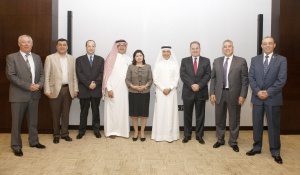Arab Air Carriers Organisation criticises EU Emissions Trading Scheme
 Pictured during the Arab Air Carriers Organisation Meeting in Doha, are from left: secretary general of AACO Abdul Wahab Teffaha; chairman Middle East Airlines Mohamad A. El-Hout; president Air Algerie Mohamed Salah Boultif; director general Saudi Arabian Airlines Khalid Almolhem; chief executive Syrian Arab Airlines & chairperson of the Executive Committee Ghaida Abdullatif; Qatar Airways chief executive Akbar Al Baker; president Etihad Airways James Hogan; chief executive Gulf Air Samer Majali; and chairman Egypt Air Hossam Kamal Abuelkheir
Pictured during the Arab Air Carriers Organisation Meeting in Doha, are from left: secretary general of AACO Abdul Wahab Teffaha; chairman Middle East Airlines Mohamad A. El-Hout; president Air Algerie Mohamed Salah Boultif; director general Saudi Arabian Airlines Khalid Almolhem; chief executive Syrian Arab Airlines & chairperson of the Executive Committee Ghaida Abdullatif; Qatar Airways chief executive Akbar Al Baker; president Etihad Airways James Hogan; chief executive Gulf Air Samer Majali; and chairman Egypt Air Hossam Kamal Abuelkheir The Executive Committee of the Arab Air Carriers Organisation has met in Doha to discuss the controversial Emission Trading Scheme implemented by the European Union.
Members of the regional aviation body, which represents the interests of commercial airlines across the Arab world, discussed the EU’s persistence in applying its ETS programme despite objections voiced by governments around the world about the scheme’s legality.
The Executive Committee called on the EU to listen to concerns, calling on it to work with the International Civil Aviation Organisation (ICAO) on a global, rather than Europe-wide, solution on how to deal with the environmental footprint of civil aviation.
The Committee decided to call on the EU to redirect its efforts on the environmental issue through ICAO and find a global solution and relinquish its unilateral application of the ETS.
As a result of the discussions, the Doha meeting declared the following:
A unilateral application of the EU ETS is violating the essence of the Chicago convention, which stipulates that the Air Transport relations between states need to be regulated by mutual consent and agreement.
The resolutions of the International Civil Aviation Organization (ICAO) have explicitly called upon states that wish to introduce initiatives in the environmental footprint of aviation, to do that in agreement with the other states whose institutions might be impacted by such initiatives.
The fact that the ETS holds airlines of the world responsible for their emissions before the European authorities, contradicts with the principles of sovereignty of states over their national aerospace, and that national institutions of states are responsible before its own authorities and not the authorities of other countries.
The Ear’s attempts to impose its own policies on other states will only lead to conflicts and trade wars which will not help the environment, the customer nor will it help the airlines.
Qatar Airways chief executive Akbar Al Baker, who hosted members at the meeting, said the Emission Trading Scheme was one of the most controversial subjects facing the global aviation industry today.
“There has to be a systematic approach to the implementation of any such scheme and, like many airlines around the world, we feel the European Union needed to take a step-by-step consultative approach before imposing programmes and penalising an aviation industry that plays a crucial role in driving economies.”

